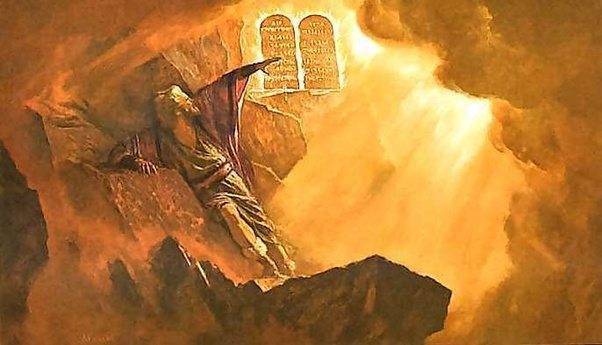“And you came near and stood at the foot of the mountain, while the mountain burned with fire to the heart of heaven, wrapped in darkness, cloud, and gloom.”
(Deuteronomy 4:11)
The revelation of the majesty of Jehovah to His people at Mt. Sinai demonstrates both His glory and His terror. As the people of Israel saw the mountain above them consumed with fire and smoke and heard the quaking of thunders and terrible voices (Ex. 19:18, 20:18; Deut. 4:11), they could draw no other conclusion but that it was a fearful thing to come to judgment before this holy God. One experience of the terror of the Lord’s holiness was enough to make the bravest among them tremble.
This grand display of God’s glory and majesty at Mt. Sinai also instilled in His people the reverence that is rightly due Him. The children of Israel were forbidden to approach beyond the bounds that God designated, and anyone who dared disobey suffered immediate death.
John Owen said of this encounter, “This prohibition was confirmed with a sanction, that everyone who transgressed it should be stoned. These things all tended to engender an awful fear and reverence of God in His giving of the law.”
Divine wisdom is evident in the choice of this mountain for the giving of God’s law. Mt. Sinai was a place of absolute solitude, a place remote from the habitation and converse of men. Here the people could neither see nor hear anything but God and themselves. With no relief or option for retreat in sight, the people of God had no choice but to bear His demonstration of holiness.
This event in history teaches us that when God deals with us according to His law, He allows us to see nothing but Himself and our own conscience. He removes our comforts, reserves, and retreats. And yet when God brings us to the mountain of Calvary, face to face with the living Word of God, we find rescue, hope, and deliverance from the condemnation that comes from that Law.
What can we learn from this passage in Deuteronomy 4? Here God gives His church a type and representation of the great judgment at the last day when sinners will have to face the raw, sheer holiness of the great and awful God and the demonstrations of His wrath. And unless we can make our plea in the interest of the blood of Christ, we are lost forever.
The law given on Mt. Sinai – in and of itself – can bring forth no good fruit, nothing acceptable to God nor useful to the souls of men. But with the introduction of Jesus, the Son of God suspended between heaven and earth on Mount Calvary, the desert gives way to rivers of living water. The law blossoms into a fruitful oasis when the righteousness of Christ fulfills it. And at Calvary, Christ satisfied God’s law and appeased His divine wrath toward all those who adore Him with a living and true faith. Blessed be our majestic God!
- This passage in Deuteronomy 4 causes me some angst, Lord. The loud peals of thunder, flashes of lightning shining along the cloud of thick darkness which covered the top of the mountain, black smoke ascending up to heaven, the quaking of the mountain (Ex. 19:16, 18; Deut. 4:11; Heb. 12:18). What was Your purpose in all this? I believe it was to demonstrate and proclaim the tremendous majesty of the Lawgiver, and to cultivate in the souls of men (like me) a reverence for Your Word and Law.
- It is interesting that on the Mount, even in the midst of such a great display of Your majesty, the Israelites saw no image of You (Deut. 4:12, 15). You did this to prevent them from entertaining erroneous conceptions of the God of heaven, or “corrupting themselves and making to themselves a graven image,” (verse 16). What could they have possibly likened You to, Lord? You say in Isaiah 40:25, “‘to whom will you liken Me, or shall I be equal?’ Says the Holy One.”
- Lord, as the most high God, You were not only pleased to publish Your laws to Israel with a loud voice, in the presence of the assembly of the whole people, but You also engraved them with Your own finger on tables of stone. You gave them the Ten Commandments, the tables of testimony (Exod. 24:12, 31:16, 18, 34:29, Deut. 18:10). These tablets contain the declaration of Your divine will. When You wrote these with Your own finger, it signified Your work to write Your law on the hearts of Your elect, according to the promise of the covenant of grace (Jer. 31:33).
Further References for Deut. 4:11
Exod. 19:18; Deut. 5:23; Heb. 12:18; Exod. 19:9; Ps. 18:11


